Share
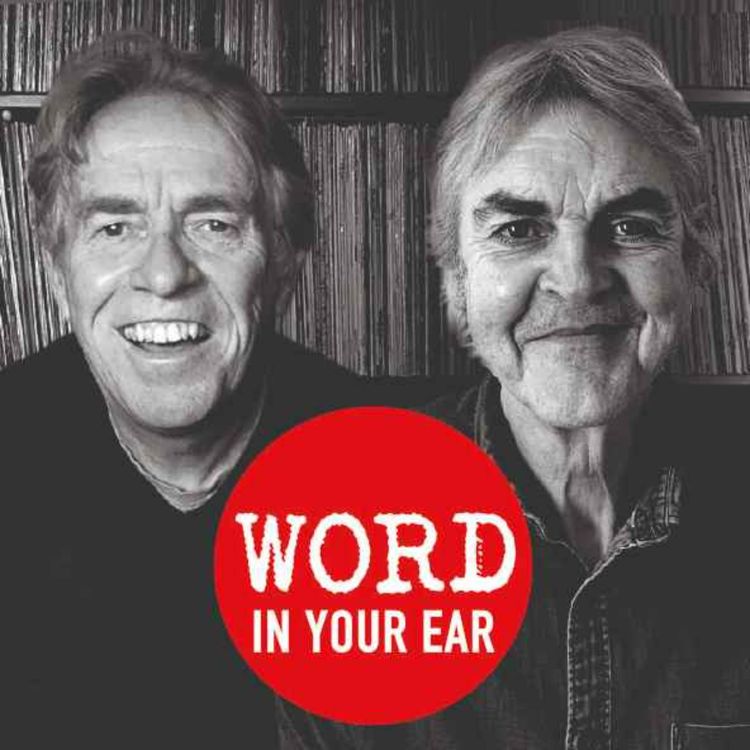
Word In Your Ear
The extraordinary story of Arthur Lee, Love and the 1966 flop which became a hit for the ages
Love’s official biographer John Einarson tells David Hepworth the star-crossed tale of the band who made the least psychedelic album of the psychedelic era. Their conversation takes in:
….Lee’s growing up between Memphis and L.A., dealing with the problems of looking more like Johnny Mathis than Otis Redding.
….how being indulged as a youngster by his family made him a tyrant as a band leader.
….growing up with a prodigious musical talent but without the mastery of a single instrument.
….refusing to put up with the inconvenience of touring and bearing personal grudges which prevented him taking up life-changing offers.
….their competition with The Doors, who would do all the things that Love wouldn’t.
…how Arthur Lee heard Forever Changes in his head and how he transferred that knowledge to an arranger who’d never heard a pop record.
….why Brian Wilson, John Sebastian and Arthur Lee “never got past 1967”.
….the gun charges that put Arthur Lee in jail and the third act he enjoyed when he came out.
You can order the book here: https://www.amazon.co.uk/Forever-Changes-Authorized-Biography-Arthur/dp/1916829120/
Find out more about how to help us to keep the conversation going: https://www.patreon.com/wordinyourear
More episodes
View all episodes
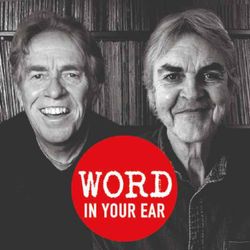
880. Albums we bought because we liked the title
46:55||Ep. 880Spinning sides at the conversational disco to see what fills the dancefloor, which this week includes … … Jerry Garcia had seven fingers! Brian Jones had seven children! Morrissey worked for the Inland Revenue! … the most terrifying villain in the history of cinema ... is pop music becoming inbred? … when Neil Sedaka made records with 10cc (and Abba) … Happy? Get Lucky? Crazy In Love? What was the last hit single the whole world seemed to be singing? … Noddy Holder, Kim Wilde, Robert Wyatt, Gary Numan: what makes you a National Treasure? … rock and roll puns and double-entendres … “drawn from the national conversation”: the divine Englishness of the Pet Shop Boys … the Gilded Palace of Sin, In The Court of the Crimson King and other records we bought because of the title … and acts wiped out by the Beatles “like corn before the sickle”.Help us to keep the conversation going: https://www.patreon.com/wordinyourear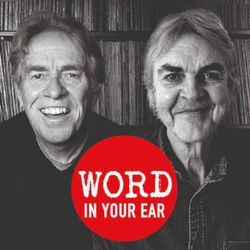
879. How Glenn Tilbrook transformed the life of Squeeze
33:53||Ep. 879Glenn Tilbrook wrote an album with Chris Difford about a futuristic nightclub when they were teenagers and, 52 years later, they’ve recorded it and are performing it on the upcoming tour. He looks back here at the partnership that once wrote 200 songs in three years, the first gigs he saw, his recent decision to take control of the group and what’s changed the way they sound. Among the highlights … … what he learnt from watching Radiohead and Doechii … when you walk into a teashop and Tír na nÓg are playing … T. Rex and screaming girls at the Lewisham Odeon – “comfortable, confident, thrilling” … Terry Reid, Traffic, Bowie and darker memories of Glastonbury 1971 … “that age when Pickettywitch are as engaging as the Rolling Stones” … the song that came to him in a dream … constructing “a knockout set that’ll slay any audience” … winning a talent contest at Butlins in Clacton, aged 12 – “a week’s free holiday!” … “the breadth and depth of what we can do now outstrips the way we were”. Order the ‘Trixies’ album here: https://squeeze.lnk.to/trixies And Squeeze tickets here: https://www.squeezeofficial.com/Help us to keep the conversation going: https://www.patreon.com/wordinyourear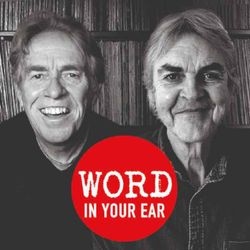
878. The Skids, Big Country and the unsettling story of Stuart Adamson
46:12||Ep. 878Stuart Adamson co-founded the Skids and Big Country but was profoundly ill-suited to the spoils of his success. Author Scott Rowley unpacks his passage from Dunfermline to Nashville and Hawaii to get a sense of his demons and what drove and inspired him. He talks to us here about his compelling new memoir ‘Stay Alive: the Life and Death of Stuart Adamson’ and touches on … … hints of troubled family life in his early lyrics and the shadows of his father and grandfather … that famous three-word review: “More crusading porridge!” … the guilt of his success when he returned to his Dunfermline roots … why learning to sing is unwise! … how Big Country were saved by Steve Lillywhite and the resentment about their being sold as a pop group … Nick Drake, Sinead O’Connor … “people who should never have been given a record contract” … insurmountable friction with Richard Jobson … how Nevermind made the old rock landscape look outmoded … “guitars that sounded like bagpipes!” and other hoary old clichés … “empty, breast-beating, bombastic!”: the rigours of the rock press consensus … and how Big Country nearly played Live Aid. Order ‘Stay Alive: the Life and Death of Stuart Adamson’ here: https://www.simonandschuster.co.uk/books/Stay-Alive-The-Life-and-Death-of-Stuart-Adamson/Scott-Rowley/9781917923538Help us to keep the conversation going: https://www.patreon.com/wordinyourear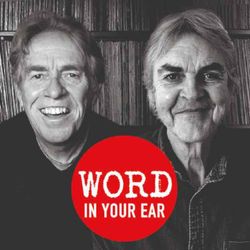
877. There are only three Rock National Treasures – and we name them!
49:25||Ep. 877Our ‘big air’ manoeuvres on the rock and roll ski jump this week land the following tricks … … why don’t we re-use old protest songs instead of writing new ones? … “a temple of music and gothic lust:” would YOU buy Jim Steinman’s unsellable home? … when Madness played on the Buck House roof … Ptolomaic Terrascope? Aquarium Drunkard? Real and made-up music magazines … “too complicated, not catchy, like a high-minded think-piece”: U2’s Days Of Ash EP … when the Ramones invaded the London library … Rod, Elton, Adele, Noel, Ed … do they cut it as National Treasures? … “the best sport still works with the sound off” … what links Steely Dan to American College Football? … plus the Bishop of Ramsbury, Robyn’s “dream doner” and birthday guest Keith Adsley with a quiz about American college football walk-out music.Help us to keep the conversation going: https://www.patreon.com/wordinyourear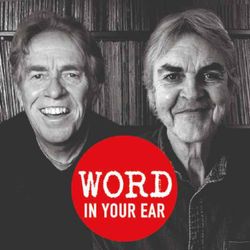
876. Keith & Chuck, Bowie & Tina, Frank & Elvis and what we learnt from rock’s joint ventures
41:53||Ep. 876Some shared stages. Some made records and films together. Some had love affairs. Matt Thorne is fascinated by stars’ collaborations and what they reveal about them. He talks here about 14 musicians who collided and the discoveries he made in the six years spent writing ‘Famous: Ego, Envy and Ambition in Pop, Rock and Hip-Hip’, with all this high in the mix … … Frank Sinatra’s ‘Welcome Home Elvis’ TV Special and how threatened he felt by rock’n’roll … “Chuck Berry thrived on tension in exactly the way Mark E Smith controlled the Fall” … what you’ll find in Lou Reed’s archive at New York’s Library for the Performing Arts … McCartney at “the showbiz event of the year”, January 1968, at a rare low ebb in the Beatles’ fortunes … the mystifying One Trick Pony where Paul Simon inexplicably chose to play a failure, and his comic turn on Saturday Night Live … Bowie’s and Tina Turner’s TV ad and love affair … what Chuck Berry tried to hide about his studio trickery and the “psychological terrorism” of what played on his TV sets … “all musicians are obsessed with the idea that they’re on the way out” … why a book like this would have been impossible 30 years ago … and Dave Stewart’s vision of Lou Reed as a piece of pasta on a motorcycle. Order copies of ‘Famous: Ego, Envy and Ambition in Pop, Rock and Hip-Hip’ here: https://www.waterstones.com/book/famous/matt-thorne/9781474616386Help us to keep the conversation going: https://www.patreon.com/wordinyourear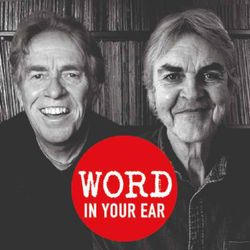
875. Boston, Def Leppard, bad hair & the golden age of rock radio
35:20||Ep. 875Paul Rees fell in love with AOR when it began with Boston in 1976, the polished, ramped-up hits that were briefly the music of the American heartland. His book ‘Raised On Radio: Power Ballads, Cocaine & Payola – the AOR Glory Years 1976-1986’ remembers the age when records were launched via car stereos, their eternally appealing sound and the preposterous lives of the people who wrote and played them – Bon Jovi, Pat Benatar, Asia, REO Speedwagon, Don Henley and Toto among them. “It’s happy music,” he points out. “Music that makes you raise a quizzical eyebrow.” In the mix … … the original AOR sound: “Led Zeppelin hard rock with Eagles harmonies and a stratospheric high-tenor voca|” … the absolute power of producers like Mutt Lange (a man raised on radio jingles) … Pat Benatar, the former married bank clerk who wanted to be Robert Plant in a leotard … “AOR stars were all salesmen who talked in quotes” ... the many reasons Don Henley fired people on a whim … Def Leppard’s vision of America built on AOR and cowboy movies … “Chicago and the Tubes never played on their records” … “he ended up butterball-naked in a cocaine threesome sting with two disguised police women” … the producer who had his trout pond realigned as he couldn’t work looking at a garden that wasn’t symmetrical … the story of Toto’s Africa: “tape loops strung round chair-backs and a quick flick through a geography book” … “if this record’s a hit I’ll run naked down Sunset Boulevard”. Order a copy of ‘Raised On Radio: Power Ballads, Cocaine & Payola – the AOR Glory Years 1976-1986’ here: https://www.amazon.co.uk/Raised-Radio-Paul-Rees/dp/1408721112 Help us to keep the conversation going: https://www.patreon.com/wordinyourear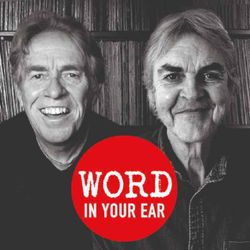
874. Was Bad Bunny at the Superbowl the greatest show ever staged?
01:03:58||Ep. 874After 40 days of relentless rain, you need our little ray of sunshine. And here we all are! Sitting in the rock’n’roll rainbow this week you’ll find … ... the Wuthering Heights instagram gold-rush … licensing Foreigner and Lynyrd Skynyrd: when is a band not a band? .. what Michael Jackson asked the Superbowl promoter … one long video for Charli XCX: “if that film was playing in my back garden I’d draw the curtains” … Bob Dylan & Kurtis Blow, Kate Winslet & ‘Weird Al’ Yankovic: a brief history of weird duets … a walk-on forest, 300 extras, 29 hidden messages: how can you top Bad Bunny? (“Disgusting!” – D Trump) … what a 1969 Rock Encylopedia said about “the poets and minstrels of our time” … “biopics are designed for people who don’t know the subject” ... Paul Anka did Smells Like Teen Spirit? The Flaming Lips did Kylie Minogue? … whippets, flat caps, bottles of stout: begone hoary old Yorkshire clichés! … “that’s the biggest power station in Western Europe – and I know the manager!”: our love for Alan Bennett … plus Top Gear, M*A*S*H, Twins Peaks, Arena (by Brian Eno) and birthday guest Paul Monaghan on great TV theme tunes.Help us to keep the conversation going: https://www.patreon.com/wordinyourear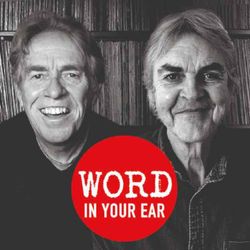
873. Andy Bown remembers the Herd, Judas Jump and 47 years in Status Quo
32:20||Ep. 873Andy Bown found the 20 year-old recordings of “a deep-space love story” he’d written with the sci-fi author Russell Hoban and he’s just reworked and released them. He talks to us here about “Out There” and life in the Herd, Judas Jump and Status Quo, which involves … … playing the Three Tuns in Beckenham with Bowie … “Foot gun, gun foot. I always tell the truth.” … Peter Frampton when he was The Face of ‘68 … “we were earning £225 a night and got £15 a week. Where did the money go?” … Quo’s Whatever You Want and how co-writing works … David’s memories of the Herd supporting Chuck Berry in 1968 … opening for Hendrix at Saville Theatre, eight feet from his flaming guitar: “you could feel the heat” … Judas Jump, Don Arden, the huge advance and the “appalling” album … sessions with Jerry Lee Lewis who played the solo with his foot … early days in Status Quo when he played behind a curtain and how they got to be Live Aid’s opening act … “You’d think John Fogerty would be pleased about Rockin’ All Over The World. Au contraire!” Order ‘Out There: A Deep-Space Love Story’ here: https://andybown.com/Help us to keep the conversation going: https://www.patreon.com/wordinyourear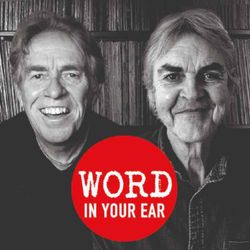
872. How the album survived and why it satisfies the soul!
38:46||Ep. 872The album has had 25 years of being hammered by other formats – Napster, iTunes, Spotify, TikTok – and not only survived but thrived. For Keith Jopling it’s the irreplaceable way to hear music and to measure the people who make it. His new book Body Of Work celebrates its battle-scarred trajectory from the beating heart of pop culture to 21st Century affordable luxury, and stops off at … … growing up in the age of cassettes … his lifelong devotion to a Police album left on his doorstep … Adele’s battle with Spotify to get records played in sequence … how albums are how you calibrate a career, from the Beatles to Taylor Swift … has anyone ever loved a CD the way they love an album? … how parents used to despair of their kids loafing in bedrooms listening to records but now try and persuade them to do it … pictures of equipment: rock porn! … the swingback to Listening Parties and analogue recording … records as shining examples of the packaged goods business … “we need to regain control of our attention” … and the iTunes launch party and why Smashing Pumpkins thought they’d seen the future. Order Body Of Work in the UK here: https://www.roughtrade.com/product/keith-jopling/body-of-work-how-the-album-outplayed-the-algorithm-and-survived-playlist-culture And in the USA here: https://repeaterbooks.com/product/body-of-work-how-the-album-outplayed-the-algorithm-and-survived-playlist-culture/Help us to keep the conversation going: https://www.patreon.com/wordinyourear